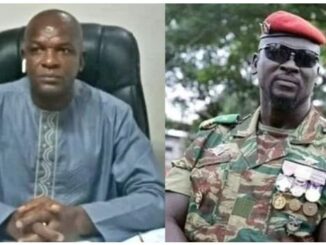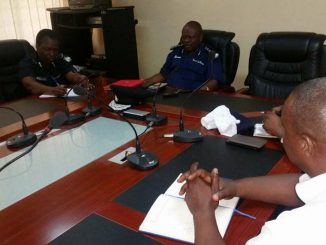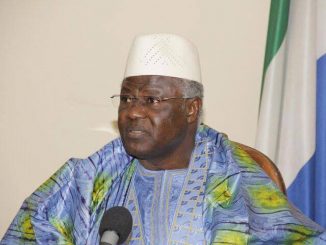“How can History judge President Kabbah kindly with all these failures ? Kabbah, unfortunately, only ended up as another statistics in Sierra Leone’s unending run of disasterous leaderships”.
KANJI DARAMY DEFENDS PRESIDENT TEJAN KABBAH’S RECORD IN POWER
KANJI DARAMY DEFENDS PRESIDENT TEJAN KABBAH’S RECORD IN POWER
The Chairman of the new National Telecommunications Commission, former Presidential Spokesman, Mr. Kemoh Kanji Daramy, has come to the defence of outgoing President, Dr. Ahmad Tejan Kabbah. Mr. Daramy , who was responding to the assessment on President Kabbah’s leadership by COCORIOKO Editor, Rev. Wilfred Leeroy Kabs-Kanu, stated that “If Kabbah has made a difference, it is because under his watch Sierra Leone has been saved from annihilation and total collapse as it was heading when Kabbah came to the Sierra Leonean political scene in 1996 . READ Kanji Daramy’s rebuttal , which he sent to the COCORIOKO FORUM :
Posted by Kemoh Kanji Daramy on June 23, 2007 at 21:40:52:
“Kabbah was the President who was given about everything to kickstart the nation back to its pre-and -immediate post -Independence glories, but the man just refused to spark”.
Wilfred Kabs-Kanu wrote the above as part of his assessment of Kabbah’s presidency. However, the flaw in his reasoning is that ‘Kabbah was given about everything’ as posited by my dear friend. Kabbah became president in 1996 by which time Sierra Leone had lost its ‘nationhood’ since much of Sierra Leonean territory was not under government control and authority. Rebels held sway over considerable swathe of territory and the partnership between them and soldiers over the control of power and territory had rendered Sierra Leone stateless. This statelessness, anarchy and absence of governmental authority in Sierra Leone was to occupy much of Kabbah’s attention and energy as president.
In the absence of governmental authority and control such as was witnessed, no development could have taken place, except that Kabbah and his government embarked on the simultaneous tasks of bringing about stability and creating the minimum of development allowable under a very chaotic environment. To make an illustration which I believe deludes Kabs and those who think like him, Sierra Leone and Somalia experienced the beginning of their national traumas almost at the same time by 1991. Today, Sierra Leone has regained its statehood and has embarked on development. Somalia is still in the throes of war and every effort is directed to ending their war. Development is not on their agenda. I hope at this point Kabs understands the priority of a nation-state when it is confronted with and threatened by annihilation.
If Kabbah has made a difference, it is because under his watch Sierra Leone has been saved from annihilation and total collapse as it was heading when Kabbah came to the Sierra Leonean political scene in 1996.
After World War 2 europe benefitted from a large infusion of american aid under the Marshall Plan to rebuild it. That was not the case for Sierra Leone. No huge capital infusion was done for Sierra Leone to rebuild itself or to be rebuilt by any wealthy country or group of countries. The wealthier nations have always held the position, after the end of the rebel war, to wait and see if there was going to be sustainable peace before they could make offers of funds that could address the question of rebuilding the battered infrastructure that requires huge capital commitments.
What Sierra Leone has actually benefitted from is technical assistance to return the country to normalcy. This involves helping and restructuring the army, police, the civil service machinery and local government reactivation. Basically you could call these ‘the hygiene factors’to help the country keep ‘body and soul’ together. It is like helping to mend the ‘software’ when it had gone broken and postponing the replacement of the ‘hardware’ if this illustration can help Kabs and others to see the forests from the woods. Those familiar with the workings and dynamics of international development assistance should be able to reason with me.
Talking about bilateral aid from Britain and other developed countries, it should not be difficult to understand that a very large proportion if not all of their assistance is implemented through their own non-governmental agencies where they are not the direct implementing instruments like the British have DFID on the ground and the Americans implement some of their interventions through monies held by their embassy. The discretionary powers and exercise over the purses meant for delivering development assistance are executed by the donors themselves. Even the multilaterals like the World Bank and the European Union (EU) disburse aid funds in the same pattern. Direct budgetary support is limited and exercised by a tiny number such as the EU.
The situation in neighbouring Liberia until very recent has not helped donor and investor confidence, many of whom see the problems besetting the two countries as intertwined and that unless there were visible signs of sustainable stability in both states their commitments of meaningfully huge funds were not to be expected.
President Kabbah has catalogued his successes and those of his government for all to see. My thinking is that Kabs should try to address himself to those issues rather than resorting to abstract and amorphous calculations derived from gut-feelings of failings which are far removed from contextual and environmental realities and considerations. We all tend to fall into the trap of submitting overly subjective assessments and appraisals of situations if our attempts are to reach easy conclusions through shortcuts simply because we either lack the energy or are afraid of engaging a little more resourcefulness to look at the whole rather than fractions of it. The debate between objective and subjective thinking is not new and will not end with how we appraise Kabbah or any other leader, place or thing.
“How can History judge President Kabbah kindly with all these failures ? Kabbah, unfortunately, only ended up as another statistics in Sierra Leone’s unending run of disasterous leaderships”.
This is another statement by Kabs on Kabbah. “Another statistic”. Each of us is just a number but if your neighbour has made a differece, even just a little difference, give him or her the credit. If Kabbah has led your country for eleven years and has kept it as one unified entity without cracks, why can’t you appreciate that? After all he inherited a country that was in a much worse state in 1996. He is now leaving at a time when Sierra Leone has proudly redeemed its sovereignty notwithstanding its own problems of poverty and underdevelopment which also afflict almost all the other countries in sub-saharan Africa and other least developed countries (LDCs)in different parts of the world.
Thank you for offering this opportunity of a reply through your internet forum.



